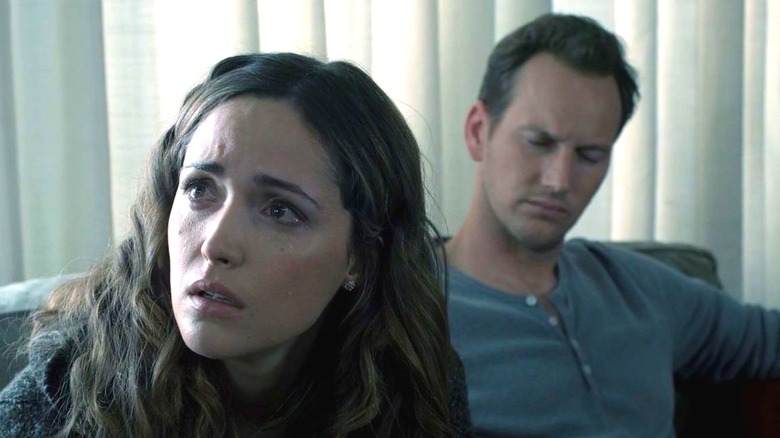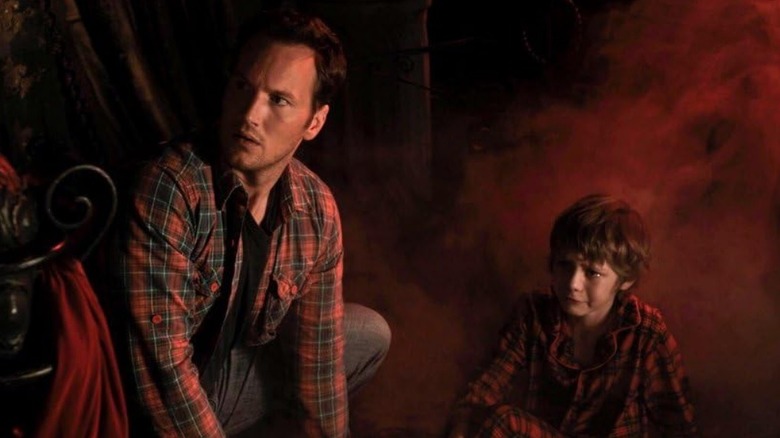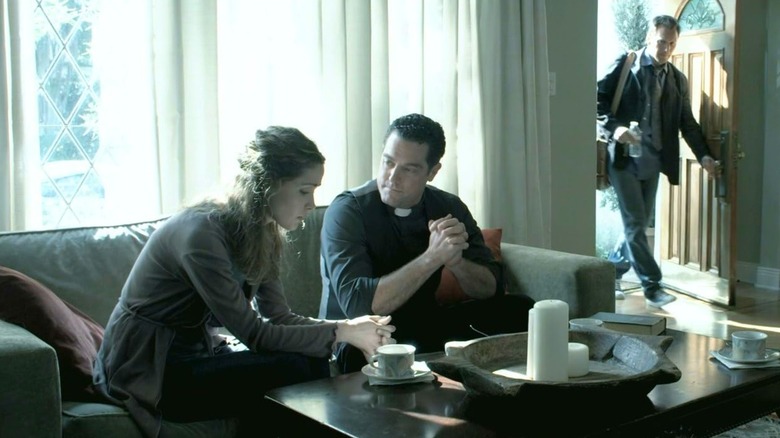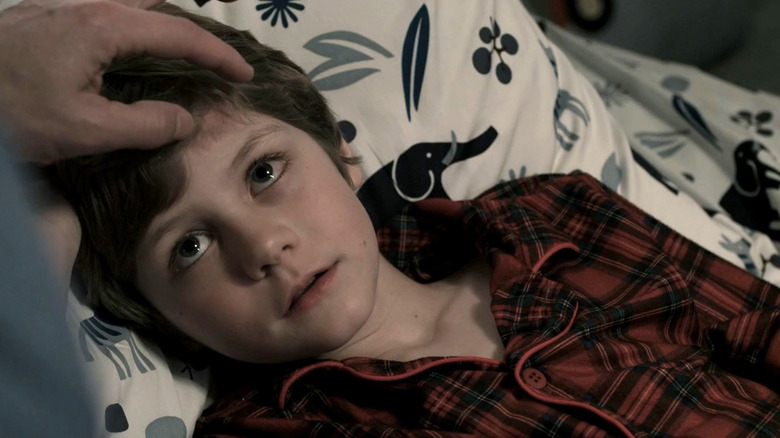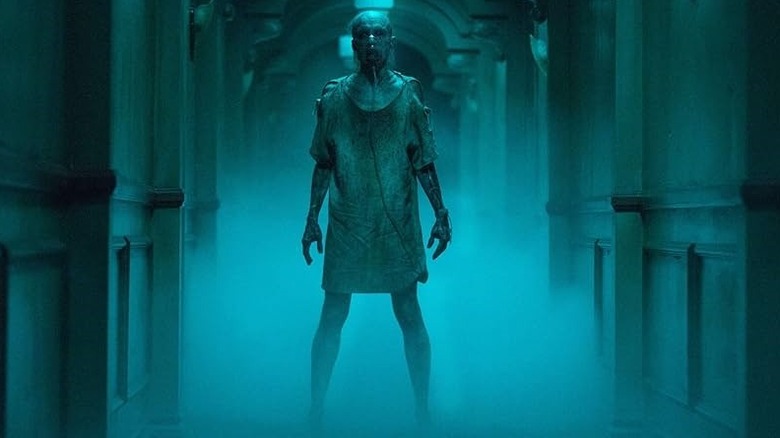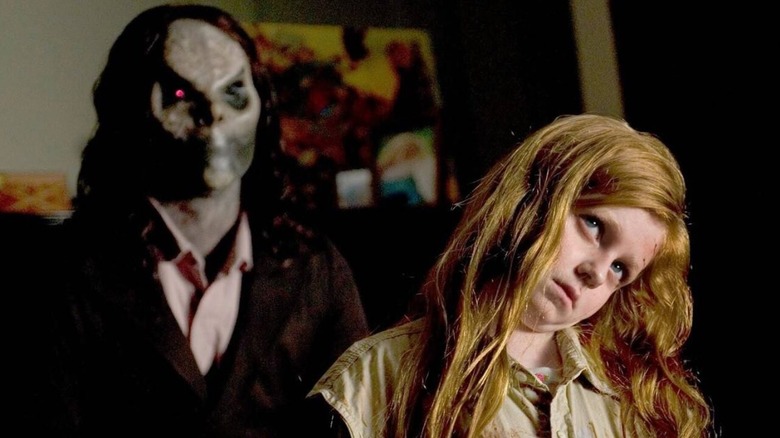Is Insidious Based On A True Story?
Over the years, we've had plenty of horror movies based on even scarier true stories. There are even some supernatural-based scary movies, such as William Friedkin's 1973 classic "The Exorcist" (widely considered to be one of the greatest horror movies of all time), that claim to be based on reality. And that's to say nothing of all the found footage ones that subtly pretend to be documentaries versus works of fiction. So, while it doesn't have any such disclaimers, the long tradition of horror movies having a basis in reality has led many to wonder if 2010's "Insidious" is based on a true story.
"Insidious" tells the tale of husband and wife Josh and Renai Lambert (Patrick Wilson and Rose Byrne), who move into a new house with their three children. When one of their sons suffers a head injury, he goes into a coma — after which the new inhabitants begin to experience hauntings, especially when in proximity to the supposedly comatose child. If it all sounds a little far-fetched to be based on something real, that's because "Insidious" is not, in fact, inspired by true events. It does, however, have an interesting backstory.
What is the plot of Insidious?
"Insidious" was written by Leigh Whannell and directed by James Wan, the same writer/director duo that made the original "Saw" film. It starts off with the Lambert family — husband and wife Josh and Renai, and children Kali (Brynn Bowie), Dalton (Ty Simpkins), and Foster (Andrew Aster) — having recently moved into a new house. Dalton is exploring the attic of the home when he falls from a ladder and bangs his head, shortly after which he thinks he sees a ghost.
Though Dalton seems to initially be okay, he goes into a mysterious coma the next day that lasts for several months. His parents are eventually allowed to bring him home despite his condition, at which point their house seems to become haunted and various members of the family — as well as anyone who visits — begins to feel the effects. As for Dalton, it is eventually revealed that what was previously assumed to be a coma is in fact something supernatural in nature.
Why do people think it's based on a true story?
As previously stated, a lot of horror movies are inspired by true stories in one way or another, some overtly so — 2003's "Open Water" was based on a real couple who got lost at sea in shark-infested waters during a scuba diving expedition and were never found, for example. Others take the inspired-by route when it comes to crafting creepy stories and characters, like Jame "Buffalo Bill" Gumb from "The Silence of the Lambs" being based on the notorious real life serial killers Ted Bundy, Ed Gein, and Gary M. Heidnik.
Even horror movies with a supernatural bent, like "Insidious," often claim to be based on documented cases. There are multiple possession/exorcism-based films that fall into this camp: Along with "The Exorcist," there's the likes of "The Amityville Horror," "The Haunting in Connecticut," and "The Exorcism of Emily Rose," to name but a few. Because of its similarity to those films, "Insidious" often gets brought up when people discuss movies that are based on real events. Despite the fact that there's nothing to back up these claims, various blogs, social media accounts, and YouTube channels dedicated to the paranormal have claimed that "Insidious" is based on one or more true stories, which has led to some people believing this is the case.
One other explanation for people believing that "Insidious" is based on a true story is that they're getting it mixed up with another horror franchise starring Patrick Wilson: The Conjuring Universe. These films are based on the recollections of real life paranormal investigators Ed and Lorraine Warren, though there's plenty that 2013's "The Conjuring" doesn't tell you about the true story.
What did the filmmakers base the movie on?
The only connection that "Insidious" has to anything in real life is that director James Wan and screenwriter Leigh Whannell asked people to tell them about experiences they've supposedly had with ghosts and other creepy occurrences. Now, plenty of people obviously believe in that type of thing — and you might be one of them — but that still doesn't equate to "Insidious" being directly based on a true story. Wan and Whannell just used some of the stories people told them to help build out the movie. More accurately, the duo were interested in astral projection (more commonly known as an out-of-body experience) as well as the very real phenomenon of sleep paralysis.
Those two things formed the basis for what would eventually become "Insidious," and it worked very well. The majority of critics enjoyed the movie and it made a tidy profit, becoming an example of a low-budget movie that actually made a ton of money: Despite having a budget of approximately $1.5 million, it raked in box office returns of over $100 million worldwide. And, as previously mentioned, it has gone on to spawn additional installments. At the time of this writing, there are two sequels and two prequels. The combined budget of all five films is $45 million, and together they've brought in $740 million globally, so a horror movie doesn't need to be based on a true story to be a success.
How have the sequels fleshed out the story?
After 2010's "Insidious" came 2013's "Insidious: Chapter 2," 2015's "Insidious: Chapter 3," 2018's "Insidious: The Last Key," and 2023's "Insidious: The Red Door." However, like many horror film franchises, the in-universe chronology of the movies doesn't remotely match the order in which the movies were released. So how do you watch the "Insidious" movies in story order? "Chapter 3" is a prequel to the original film. That comes first, to be followed by "The Last Key." Then it's the original movie, "Chapter 2," and "The Red Door." Like the original, none of these additional films are based on true stories, but they do flesh out the franchise lore considerably.
"Chapter 3" takes place three years before the Lambert family is first haunted, with medium Elise Rainier (Lin Shaye) and ghost hunters Specs (Leigh Whannell) and Tucker (Angus Sampson) dealing with the demons as they terrorize the Brenner family. "The Last Key" sees Elise as a child in the 1950s (her family also dealt with being haunted), and then jumps back and forth between that time period and 2010, where Elise, Specs, and Tucker help the family that now live in Elise's still-haunted childhood home. "Chapter 2" and "The Red Door" are more straightforward sequels that continue to follow the Lamberts and their battles against paranormal evil, with the latter bringing in the now college-age Dalton's roommate Chris (Sinclair Daniel) and the spirit of Josh's long-dead father (David Call) into the mix.
What does the future hold for the series?
As of this writing, 2023's "Insidious: The Red Door" remains the most recent entry in the franchise, but it's far from dead, with several projects in the pipeline. In 2018, producer Jason Blum revealed that a crossover movie between the "Insidious" and "Sinister" franchises has been discussed, and he's optimistic that the project could still happen someday (incidentally, the first "Sinister" film was based on a nightmare screenwriter C. Robert Cargill had after watching "The Ring"). May 2024 saw the announcement of a sixth "Insidious" movie to be released summer 2025, though it would later be delayed and as of yet hasn't received a revised release window. And what's a successful horror movie franchise without spin-offs?
"Insidious" is due to get its first spin-off by way of a movie called "Thread: An Insidious Tale," confirmed in May 2023 along with the reveal that Kumail Nanjiani and Mandy Moore are attached to star. News has been quiet as far as updates since that announcement, but there hasn't been any word on "Thread" being canceled, so we can only assume that it's still in the works. Will it be based on a true story? The synopsis suggests not — it's apparently going to be about time travel. "The story here is that of a husband and wife (Nanjiani and Moore) who enlist the help of a spell to travel back in time, such that they can prevent the death of their young daughter," Deadline reports. "The consequences, of course, prove to be severe."
